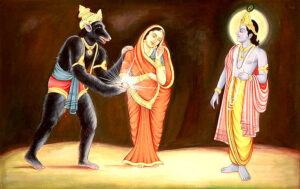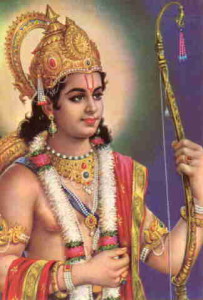Discovery of the Lizard in the Well
In the tenth canto of Srimad Bhagavatam, we find an intriguing example that illustrates how the intricate laws of karma bind a person in suffering.
Once, when Krishna was residing in Dwaraka, the children of Dwaraka—Samba, Pradyumna, and others—were playing in a small forest. During their play, they became very thirsty and stumbled upon a deep well. With playful excitement, they ran to the well, only to find that it was dry. However, to their astonishment, they discovered a large lizard trapped at the bottom, appearing as huge as a mountain. The boys, filled with amazement and compassion, decided to rescue the lizard. They tried using leather straps and ropes to pull the creature out, but despite their best efforts, they could not lift it.
Seeking Divine Assistance
The children, realizing they were unable to save the lizard on their own, knew exactly whom to turn to for help. They hurried to the palace of Lord Krishna, Dwarakadhish, and informed Him of the situation. They said, “There is a big lizard in the well, and we want to save him. Please come and help us.”
In times of difficulty, we must remember that turning to the Lord is the most reliable solution. The Chaitanya Charitamrita states that by remembering Sri Chaitanya Mahaprabhu, even the most challenging tasks become easy, and without Him, even the simplest tasks become impossible. The children’s act of seeking Krishna’s help is a lesson for all of us.
The Importance of Devotee Mercy
It is crucial to understand that when devotees appeal to Krishna on our behalf, He is always eager to save us. This is why we should approach the Guru and the Vaishnavas, who are dear to Krishna. Due to their surrender and service, they belong to Krishna’s spiritual family. We, like lizards trapped in the well of material existence, are often helpless and unsure of how to escape. But if we receive the mercy and compassion of Krishna’s devotees, and they appeal to Krishna for us, He will surely come to our rescue. This is why the mercy of a devotee is considered more accessible than the mercy of God, as devotees actively seek to deliver that mercy to us.
The blessings of the devotees are embedded in their instructions. When we follow these instructions, especially the most important one—always remembering Krishna—we receive Krishna’s grace. In this age of Kali Yuga, regardless of the “well” we find ourselves trapped in, if we receive the mercy of the Vaishnavas and learn from them the process of chanting Krishna’s holy names, we will be delivered from material suffering.
Krishna’s Transformative Touch
Krishna, ever compassionate, came to the well. With His left hand, He lifted the lizard out and placed it on the ground. To everyone’s astonishment, the lizard transformed into a beautiful demigod. Similarly, our material bodies may resemble lizards, trapped in the well of material life. But when Krishna, by His causeless mercy, lifts us up, He revives our original spiritual form—eternal, full of knowledge, and full of bliss.
Although Krishna is omniscient, knowing past, present, and future, He asked the demigod to narrate his story for the benefit of others. The demigod explained how he had practiced a form of karma-kanda, a religious system focused on performing pious activities for material gain.
The Consequence of a Mistake
The demigod revealed that in his previous life, he was King Nriga, known for his wealth and charity. He had given innumerable cows to Brahmins as gifts. These cows had golden-plated horns, silver-plated hooves, and were adorned with beautiful garlands and silk. However, unbeknownst to him, one of the cows returned to his herd and was given away to another Brahmin.
When the first Brahmin realized this, he accused King Nriga of stealing the cow—a grave offense in Vedic culture. King Nriga, realizing his mistake, tried desperately to rectify the situation by offering many more cows to each Brahmin. However, neither Brahmin was willing to compromise, leading to a heated argument between them.
The Fragility of the Fruitive Path
King Nriga was deeply disturbed, realizing that despite years of perfect religious practices, this one mistake could ruin everything. This is the precarious nature of karma-kanda; one error can negate a lifetime of good deeds. Ultimately, King Nriga died and was brought before Yamaraj, the god of death. Yamaraj offered him a choice: enjoy the fruits of his good deeds in heaven or first suffer for his mistake. King Nriga chose to suffer first and was immediately transformed into a lizard, trapped in a well.
The Invaluable Blessings of Devotees
King Nriga was ultimately delivered by Krishna due to a blessing he had received in his previous life. King Nriga had once built a temple for a devotee of Krishna and distributed copies of the Bhagavad Gita and Srimad Bhagavatam. The devotee was so pleased that he blessed King Nriga, saying, “In the future, you will see Krishna.” This blessing came true when Krishna personally lifted him out of the well.
This story teaches us that there is nothing more valuable than the blessings of devotees. These blessings can change the course of our lives and bring us closer to Krishna.
The Supreme Goal of Life: Constant Remembrance of Krishna
After being touched by Krishna, King Nriga was completely purified. He expressed his gratitude and said, “Now that I have been cleansed of all material desires by seeing Your form and being touched by Your hand, I desire only one benediction: that wherever I may be, I will always remember You and never forget You.” This is the ultimate goal of life—to always remember Krishna and never forget Him.
The name Krishna itself is described in the Mahabharata as the “all-attractive source of all pleasure.” Therefore, the ultimate conclusion of all religious principles is to remember Krishna always. By doing so, all our heart’s desires will be fulfilled.
Lessons to be Learned
- The Complexities of Karma: Even the most pious actions can have unintended consequences if performed with material motives.
- The Power of Devotion: Unlike the rigid path of karma-kanda, the path of Bhakti is forgiving and protective, as Krishna always safeguards His devotees.
- The Value of Devotee’s Blessings: The blessings of devotees are invaluable and can lead to direct encounters with the Divine.
- The Ultimate Goal of Life: To always remember Krishna and never forget Him is the supreme perfection of life.
Prayer
“O Krishna, grant us the wisdom to follow the path of Bhakti, free from the entanglements of karma. May we always seek the blessings of Your devotees and cherish the ultimate goal of remembering You in every moment of our lives. Help us to overcome the wells of material existence and revive our original, blissful consciousness in Your loving service.”



